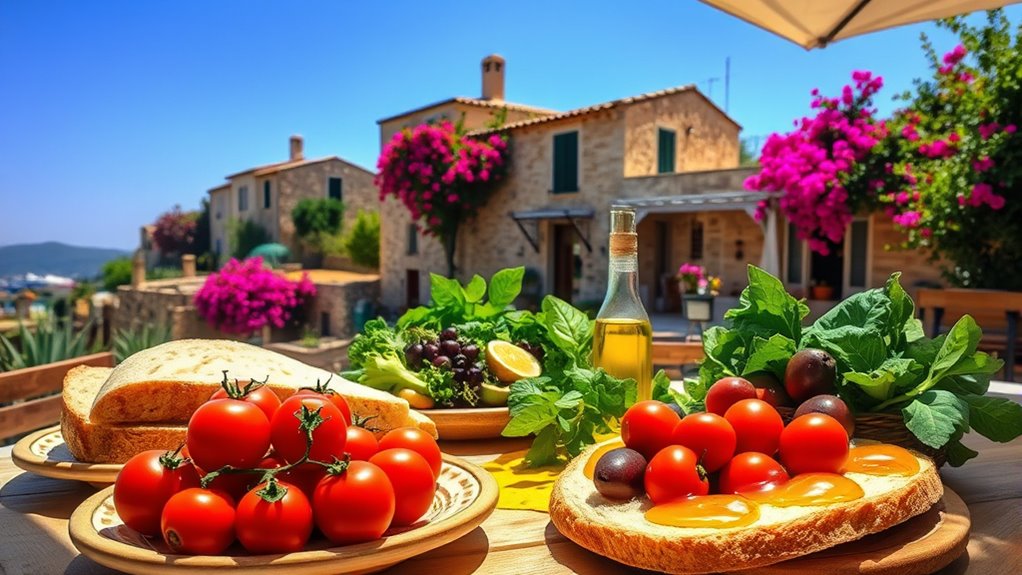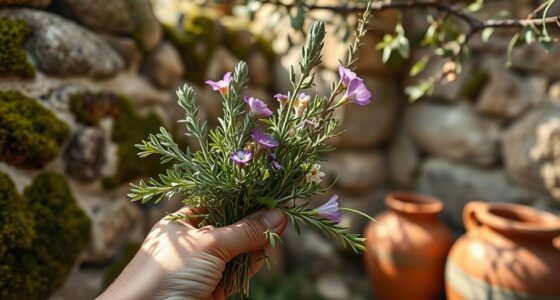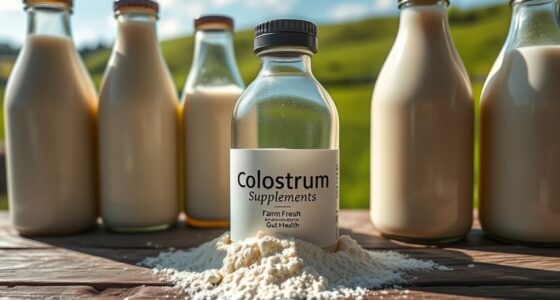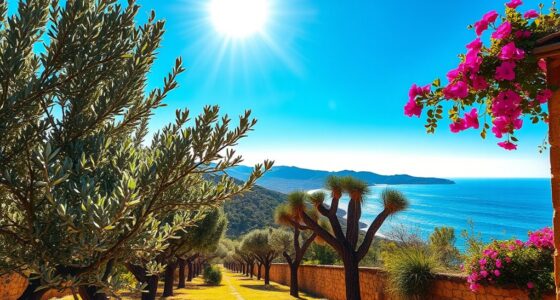The Sardinian Mediterranean diet, rich in whole grains, healthy fats like olive oil, and fermented dairy, plays a key role in supporting longevity. Active lifestyles such as herding and social meals boost cardiovascular and cognitive health. Local foods and traditional practices foster strong community bonds and prevent disease. If you want to discover how these habits combine to promote exceptional lifespan, there’s more to explore behind these wellness secrets.
Key Takeaways
- Sardinian diet emphasizes whole grains, legumes, and fresh produce, contributing to cardiovascular health and longevity.
- Extra virgin olive oil, rich in monounsaturated fats and polyphenols, reduces inflammation and supports healthy aging.
- Fermented dairy products like pecorino and goat’s milk provide probiotics and nutrients that promote gut and bone health.
- Traditional active lifestyles, including pastoral work and social meals, enhance physical and mental well-being.
- Cultural practices and seasonal, minimally processed foods foster social bonds and nutrient-rich diets linked to exceptional longevity.
Sardinia’s Blue Zone: A Model of Exceptional Longevity
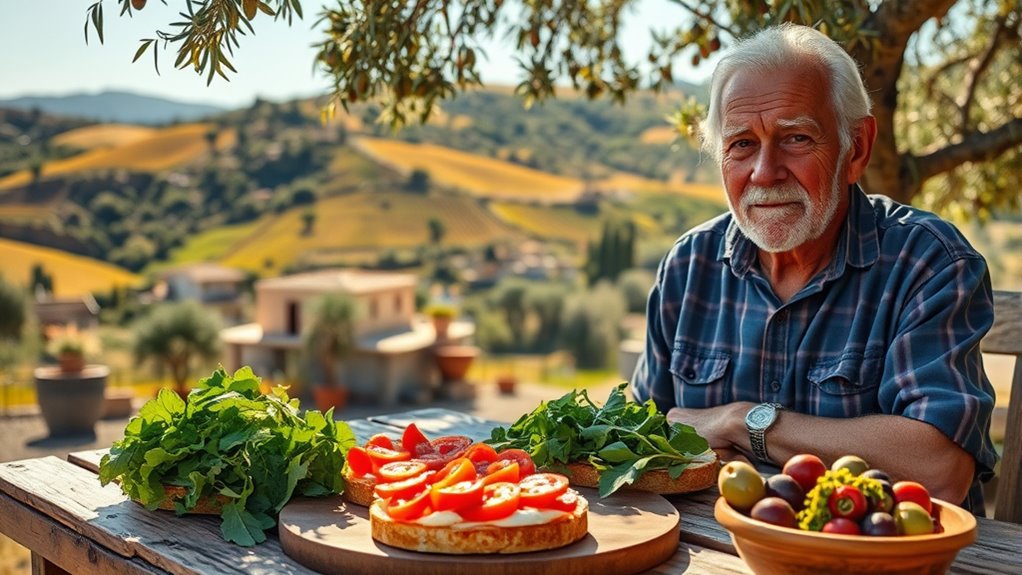
Sardinia’s Blue Zone stands out as a remarkable example of exceptional longevity, especially in the villages around Ogliastra and Nuoro provinces. Villagrande Strisaili has the highest concentration of centenarians, with an Extreme Longevity Index (ELI) of 10.8, more than double Sardinia’s average. Surprisingly, the gender ratio among centenarians is nearly equal, with 44 women and 47 men, and 16 male centenarians in Villagrande defy typical patterns. Researchers track individuals born between 1876 and 1912, revealing unique longevity patterns. Sardinians possess rare genetic markers, like M26 and variants of TAS2R38, linked to longer lifespans. This genetic foundation, combined with a traditional, active lifestyle and strong social bonds, makes Sardinia’s Blue Zone a genuine model of extraordinary human longevity. Additionally, the family-oriented culture and emphasis on community support contribute significantly to the residents’ well-being and lifespan.
Key Components of the Sardinian Mediterranean Diet
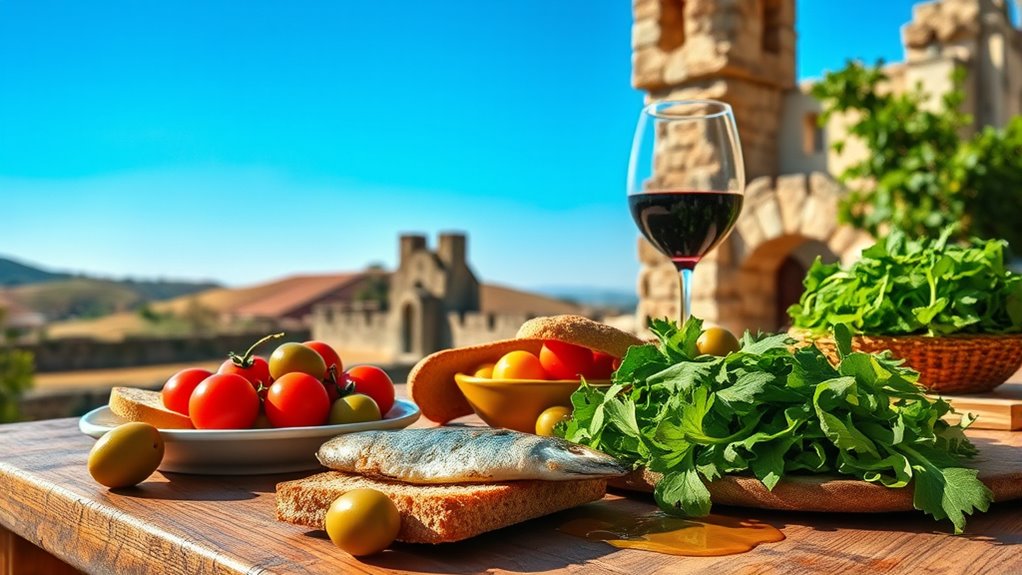
You’ll notice that whole grains like Pane carasau and fregola play a crucial role in Sardinian meals, providing sustained energy and promoting heart health. Fermented dairy products such as pecorino cheese and goat’s milk help meet nutritional needs while being easier to digest. These dairy products also contribute beneficial probiotics to support gut health. Additionally, incorporating traditional cooking methods helps preserve nutrient content and enhances flavor. Together, these components create a balanced diet that supports longevity and overall well-being.
Whole Grain Staples
Whole grains form an essential part of the Sardinian Mediterranean diet, providing sustained energy and important nutrients. These staples include:
- Pane Carasau – a traditional flatbread made from whole grains, served with meals for lasting energy.
- Whole Grain Bread – a daily staple that offers significant calories and nutrients, supporting overall health.
- Fregola Pasta – a unique, flavorful pasta used in dishes like Sardinian Paella, adding variety and fiber.
Together, these whole grains make up 47% of the diet, helping improve cholesterol, support cardiovascular health, and boost longevity. They’re deeply embedded in Sardinian culture, strengthening family bonds and preserving local traditions. Consuming whole grains regularly helps prevent chronic diseases and sustains an active lifestyle. The high fiber content in whole grains also contributes to better digestion and weight management, further promoting long-term health. Incorporating nutrient-rich foods like these into daily meals can enhance overall well-being and resilience against age-related diseases.
Fermented Dairy Benefits
Fermented dairy products, such as goat and sheep milk cheeses, play a vital role in the Sardinian Mediterranean diet’s reputation for promoting longevity. These cheeses, like Pecorino Sardo and Fiore Sardo, are rich in probiotics that support gut health and boost immune function. They provide bioavailable calcium and minerals essential for maintaining bone density as you age. The fermentation process enhances nutrient absorption and creates beneficial peptides that help regulate blood pressure and reduce inflammation. Regular, moderate consumption aligns with Mediterranean principles, promoting heart health and reducing disease risk. Additionally, these cheeses are a natural source of bioavailable nutrients, which are more easily absorbed by the body due to the fermentation process.
The Role of Fermented Dairy in Promoting Healthy Aging
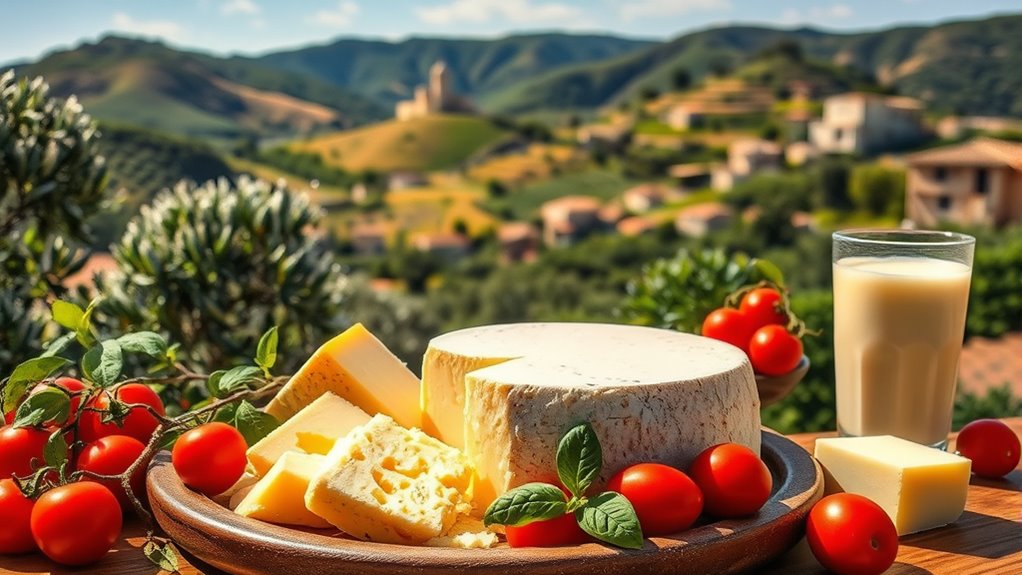
Fermented dairy products play a crucial role in promoting healthy aging, especially in regions like Sardinia where traditional dietary habits emphasize their consumption. These products, made from sheep and goat milk, contain bioactive compounds enhanced by fermentation, which may support your health. Here’s how they contribute:
- They provide high-quality protein, essential for maintaining mobility and physical performance as you age.
- Fermentation boosts bioactive peptides, helping regulate insulin activity and reduce inflammation.
- Consuming locally produced, grass-fed dairy offers added health benefits and preserves cultural practices.
- Fermented dairy also contains probiotics that support gut health, which is increasingly linked to overall well-being and longevity.
In Sardinia, moderate dairy intake and traditional recipes foster social bonds and well-being. Together, these factors support longevity and healthier aging.
How Whole Grains and Legumes Support Longevity

Since they are rich in antioxidants and anti-inflammatory compounds, whole grains and legumes play an essential role in supporting longevity within the Mediterranean diet. These foods help lower cardiovascular risk, slow aging, and reduce inflammation. Regular intake is linked to longer telomeres and decreased cellular stress, promoting healthy aging. They also improve metabolic health by regulating blood sugar and cholesterol levels, which lowers disease risks. Additionally, their nutrient density—including fiber, vitamins, and plant protein—supports muscle maintenance and balanced nutrition. Incorporating these foods helps you achieve a nutrient profile linked to longer, healthier lives. Research shows that these foods contribute to a reduction in oxidative stress, which further supports their role in healthy aging. The safety and efficacy of these foods are also supported by ongoing research into their antioxidant properties, which help combat free radicals. Here’s a quick overview:
| Benefit | Key Impact |
|---|---|
| Cardiovascular health | Lowers risk of heart disease |
| Anti-inflammatory effects | Reduces cellular inflammation |
| Longevity | Extends healthy lifespan |
| Metabolic control | Prevents diabetes and obesity |
| Nutrient density | Supports overall health |
The Impact of Olive Oil and Healthy Fats on Heart Health
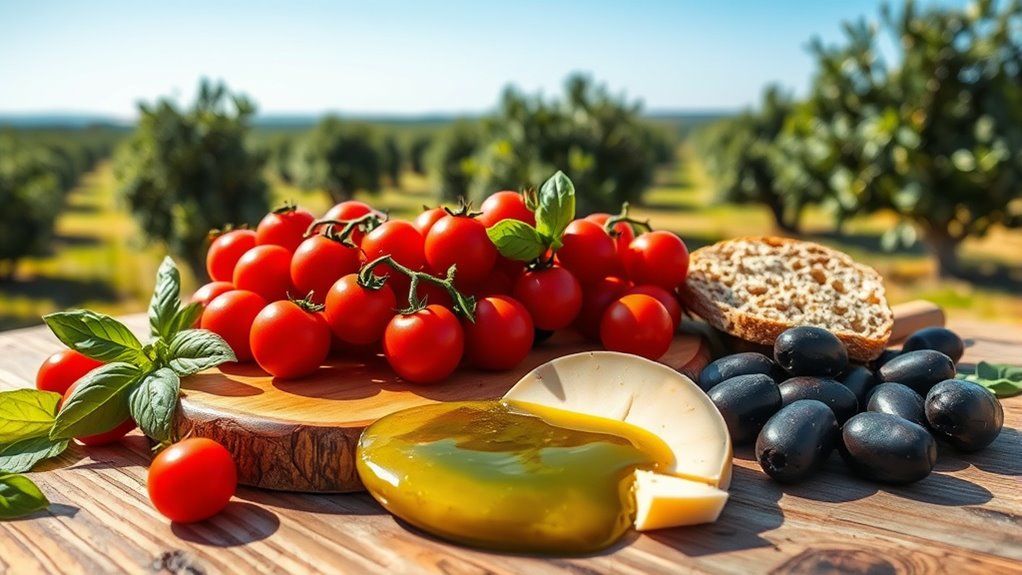
Olive oil and healthy fats play a key role in reducing your risk of heart disease by lowering inflammation and improving blood vessel health. Their unique composition, rich in monounsaturated fats and antioxidants, provides protective effects that outshine many other fats. Incorporating these fats into your diet can markedly support your cardiovascular well-being. Recent research, including the re-evaluation of the PREDIMED study, confirms that diets rich in healthy fats like those in olive oil and nuts significantly reduce the risk of heart events by about 30%, especially when adhered to consistently. Moreover, the cybersecurity vulnerabilities experienced during global outages highlight the importance of protecting digital health information associated with dietary and medical data.
Heart Disease Reduction
The Mediterranean diet markedly reduces the risk of heart disease, largely thanks to its emphasis on healthy fats like those found in olive oil. By focusing on monounsaturated fats, you lower bad cholesterol levels and protect your heart. Incorporating this diet can lead to a 47% reduction in heart disease risk over ten years. Here’s how it works:
- Boosts HDL: The healthy fats increase good cholesterol, supporting better lipid profiles.
- Provides antioxidants: Olive oil’s antioxidants protect your arteries from oxidative stress.
- Improves vascular health: The diet enhances endothelial function and helps control blood pressure.
Sticking to these principles can markedly lower your cardiovascular risk, promoting longer, healthier life.
Anti-Inflammatory Properties
Healthy fats from olive oil and other sources in the Mediterranean diet actively reduce inflammation in your body, supporting cardiovascular health. Olive oil, rich in monounsaturated fats and polyphenols, decreases pro-inflammatory molecules and improves endothelial function. Its bioactive compounds inhibit oxidative stress and influence gene expression related to inflammation control. Replacing saturated fats with olive oil lowers your overall inflammatory burden and oxidative damage. Studies show that adherence to the Med-Diet reduces biomarkers like C-reactive protein (CRP), interleukin-6 (IL-6), and fibrinogen, all linked to atherosclerosis. This anti-inflammatory effect benefits both your cardiovascular system and joint health, as seen in rheumatoid arthritis trials. Including healthy fats from olive oil and other plant-based sources helps curb chronic inflammation, promoting long-term heart health and overall well-being. Anti-inflammatory properties of olive oil play a key role in supporting healthy aging by reducing systemic inflammation.
Olive Oil Composition
Understanding the composition of olive oil reveals why it’s a cornerstone of heart-healthy diets. Its high content of monounsaturated fats, mainly oleic acid, provides significant health benefits. Here are three key points:
- EVOO contains about 70–80% oleic acid, which helps lower bad LDL cholesterol and boost good HDL cholesterol.
- Its minor components, like polyphenols and phenolic compounds, offer antioxidant effects that protect blood lipids from oxidation, reducing atherosclerosis risk.
- EVOO’s rich vitamin E and K levels support blood vessel health and blood clotting, further promoting cardiovascular health.
- The quality and processing methods of olive oil influence the retention of these beneficial compounds, making extra virgin olive oil the best choice for maximizing health benefits.
Choosing extra virgin olive oil ensures you get the most bioactive compounds, as it’s minimally processed. Its healthy fat profile and bioactive components make it a crucial element of heart-healthy eating.
Red Wine and Polyphenols: Protecting Cardiovascular Function

Red wine’s rich content of polyphenols, particularly procyanidins and flavonoids, plays a key role in protecting your cardiovascular health. These antioxidants help reduce oxidative stress and inflammation, which are linked to heart disease. The polyphenols in red wine, especially those in Sardinian Cannonau wine, are associated with improved vascular function and lower coronary heart disease risk. They support cardiovascular health by increasing HDL cholesterol and decreasing LDL oxidation. Moderate red wine consumption, when combined with a Mediterranean diet, enhances these benefits. Sardinian longevity is partly attributed to their regular intake of Cannonau wine, rich in protective compounds. Scientific studies consistently show that moderate drinking can notably reduce cardiovascular risk, making red wine a valuable component of a heart-healthy lifestyle. Polyphenol content in red wine, especially in Cannonau, is also linked to improved endothelial function, further supporting arterial health. Additionally, heart health benefits are amplified by the synergy between polyphenols and the Mediterranean diet’s emphasis on healthy fats and fresh produce.
Lifestyle Practices That Complement Dietary Benefits
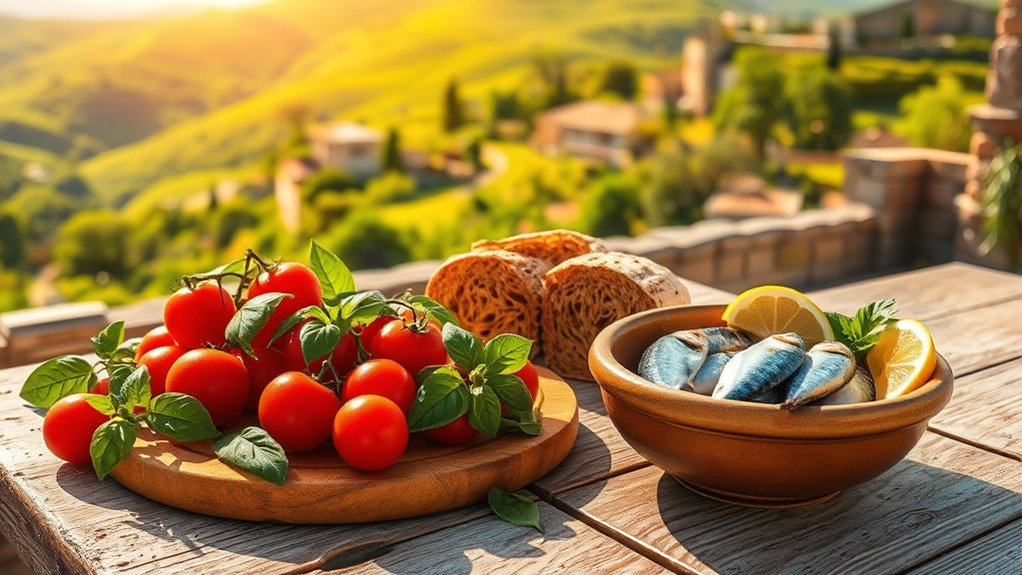
To maximize the benefits of the Mediterranean diet, you should incorporate active routines like walking and manual work into your daily life. Building strong social connections and sharing meals fosters emotional well-being and community support. Additionally, reducing processed foods and choosing whole, local ingredients helps sustain your health and longevity. Research from Blue Zones highlights the importance of a balanced lifestyle that combines diet, physical activity, and social engagement for optimal health. Incorporating physical activity into your daily routine can further enhance these health benefits and support long-term wellness.
Active Pastoral Routines
Active pastoral routines play an essential role in enhancing the health benefits of the Mediterranean diet. By engaging in daily physical work, you naturally incorporate movement that supports heart health, bone strength, and metabolic efficiency. As a shepherd, your routine might include:
- Herding sheep across rugged terrain, walking up to 5 miles daily.
- Tending livestock, gardening, and foraging, which keeps you active and connected to nature.
- Maintaining traditional skills like cheese-making and foraging, involving purposeful physical activity. Cultural significance research indicates that such consistent outdoor activity significantly reduces the risk of cardiovascular disease and promotes longevity.
This lifestyle promotes brain function and cognitive longevity through consistent movement and mental engagement. The natural rhythm of work and rest reduces stress and fosters resilience. Your active routines sustain both your physical health and your mental well-being, complementing the dietary benefits of the Mediterranean way of life.
Strong Social Bonds
Strong social bonds are vital for enhancing the health benefits of the Mediterranean diet, especially in communities like Sardinia where interconnectedness shapes daily life. You benefit from close-knit family networks that span generations, creating a reliable support system. Sharing meals and social gatherings strengthen emotional ties and cultural traditions, reducing stress and supporting immune health. Engaging regularly with neighbors and participating in community events fosters a sense of belonging and purpose, which boosts psychological well-being. Physical activities like gardening and group chores combine social interaction with exercise, improving overall health. These strong bonds and communal routines help buffer age-related stress and mental decline, promoting resilience and longevity. Sardinian social cohesion, rooted in tradition and mutual care, plays a vital role in their impressive lifespan. Research shows that social connections contribute to better health outcomes, highlighting the importance of community and emotional support in longevity.
Low Processed Food Intake
Emphasizing minimally processed foods is a key lifestyle practice that enhances the health benefits of the Mediterranean diet. By choosing simple, homemade dishes, you preserve nutrients and avoid harmful additives. Here’s how Sardinians do it:
- They prepare foods like cheese, vegetables, and legumes with minimal processing, using fresh ingredients and traditional methods.
- Their meals focus on whole, locally sourced items—fruits, nuts, and grains—prepared with olive oil, lemon, and garlic.
- They avoid heavily processed sugars, refined grains, and packaged snacks common elsewhere, reducing intake of unhealthy additives.
- This low processed food intake practice also encourages mindful eating and stronger connections to local food traditions.
This approach supports better health, lowers the risk of chronic diseases, and complements the diet’s protective effects, contributing to Sardinia’s renowned longevity.
Genetic and Environmental Factors Influencing Sardinian Longevity

Sardinian longevity results from a complex interplay of genetic and environmental factors. You benefit from a population with unique genetics, such as high rates of autoimmune and monogenic diseases, especially in Ogliastra, though direct links to longevity are unclear. Sardinians’ status as a founder population with minimal admixture simplifies identifying longevity traits, but evidence remains indirect. Environmentally, physical activity from pastoral work and lifestyle choices play crucial roles, especially in male longevity. No single factor dominates; instead, it’s the combination that matters. Research like the SardiNIA project uses genome-wide studies to explore these influences, but no specific “longevity gene” exists. Factors like genetics, environment, and behavior together shape Sardinia’s exceptional lifespan.
| Genetic Factors | Environmental & Lifestyle Factors |
|---|---|
| Unique genetic landscape in Sardinia | High physical activity levels |
| Founder population with minimal admixture | Lifestyle choices and infectious history |
| Limited conclusive links to longevity | Combined gene-environment interactions |
How Local Food Traditions Sustain Long-Term Well-being

Traditional food practices in Sardinia play a crucial role in supporting long-term well-being by focusing on locally sourced, minimally processed ingredients. This approach guarantees you consume fresh, nutrient-rich foods that promote health. Here are three ways these traditions sustain your well-being:
- Local grains and legumes: Barley, fava beans, and chickpeas stabilize blood sugar, boost fiber intake, and support a healthy gut microbiome, reducing disease risk. These foods have been linked to lower cholesterol and improved heart health.
- Seasonal produce and dairy: Fresh fruits, vegetables, and sheep’s milk cheese provide antioxidants, vitamins, and unique nutrients that combat inflammation and strengthen immunity.
- Culinary customs: Slow cooking, shared meals, and mindful eating preserve nutrients, foster social bonds, and cultivate a balanced, sustainable diet that promotes longevity.
Scientific Insights Into the Synergy of Diet and Lifestyle

While genetics do play a role in longevity, they account for only part of the story. Your lifestyle choices—diet, activity, social connections—have a greater impact. Scientific studies show that the Mediterranean diet combined with active, community-oriented living boosts health and lifespan. For example, Sardinians often engage in routine physical activity like shepherding, which promotes cardiovascular health. They also maintain strong social bonds that reduce stress and support mental well-being. Cellular mechanisms linked to mitochondrial variants may lower disease risks like dementia and cancer. Here’s a quick overview:
| Factor | Impact | Example |
|---|---|---|
| Diet | Reduces cardiovascular and cancer risks | Whole grains, olive oil |
| Physical activity | Enhances mitochondrial function | Shepherding, walking |
| Social engagement | Lowers stress, improves immune response | Community gatherings |
| Lifestyle balance | Promotes longevity beyond genetics | Stress reduction practices |
This synergy creates a holistic environment for exceptional longevity. Research indicates that these combined factors lead to healthier aging and increased lifespan.
Frequently Asked Questions
What Specific Genes Contribute to Sardinian Longevity?
You’re asking which specific genes contribute to longevity in Sardinia. Despite extensive research, no clear genetic markers have been identified that directly link to longer life in this population. Sardinian genetics show high homogeneity, but studies suggest genetics play a limited role. Instead, environmental, lifestyle, and social factors seem more influential. Future research may uncover subtle genetic influences, but for now, longevity appears more connected to external factors than specific genes.
How Does Community Social Structure Influence Health Outcomes?
Imagine a vibrant tapestry woven with close-knit threads of family and community, where your daily interactions boost your well-being. This strong social structure offers constant support, reducing stress and promoting emotional resilience. When you’re valued, respected, and engaged in shared activities, your health improves, and life satisfaction grows. Your community’s bonds create a nurturing environment, helping you stay active, connected, and healthier longer, fostering a sense of purpose and belonging.
Are There Differences in Diet Between Rural and Urban Sardinians?
You notice there are clear dietary differences between rural and urban Sardinians. In rural areas, you find more access to fresh, locally grown produce, traditional dairy, and self-cultivation, leading to a balanced diet. Urban residents rely more on processed foods, meats, and olive oil, with less emphasis on seasonal and traditional foods. These variations influence health, with rural diets often being more nutrient-rich and linked to better longevity.
What Role Does Environmental Quality Play in Lifespan Extension?
You might think genetics determine longevity, but environmental quality plays a vital role. It reduces exposure to harmful pollutants, promotes cleaner air, and offers restorative natural spaces. While medical advances help, improving your surroundings can slow biological aging and boost overall health. By minimizing environmental stressors like pollution and maximizing green spaces, you support a longer, healthier life—showing environment’s powerful influence beyond genetics alone.
Can Sardinian Dietary Practices Be Adapted Elsewhere Effectively?
You’re wondering if Sardinian dietary practices can be effectively adapted elsewhere. While the core focus on plant-based foods, healthy fats, and moderate animal proteins is broadly applicable, challenges like local food availability, cultural differences, and lifestyle factors can hinder direct replication. To succeed, you should modify the diet to fit regional ingredients and social habits, emphasizing fresh, minimally processed foods and community eating to promote health and longevity.
Conclusion
Imagine walking through Sardinia’s sunlit hills, where vibrant gardens burst with fresh vegetables and fragrant herbs. By embracing the island’s simple, nourishing foods and active lifestyle, you can access your own path to longevity. The Mediterranean diet, rich in wholesome grains, healthy fats, and fermented dairy, isn’t just about food—it’s a way of life that fosters vitality. Start small, savor each bite, and let Sardinia’s timeless secrets inspire your journey to lasting well-being.
